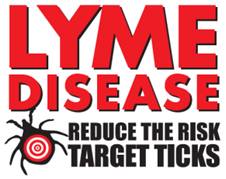Lyme disease is an illness caused by bacteria called Borrelia burdorferi. It is spread by the bite of an infected blacklegged tick. Most people who get Lyme disease recover fully after being treated by their healthcare provider. If not treated, Lyme disease can be serious.
Who’s at Risk?
There are many different types of ticks. Only blacklegged ticks can spread Lyme disease.
Blacklegged ticks, which are sometimes called deer ticks, are commonly found in wooded, grassy areas throughout Chatham-Kent, especially in the Rondeau Park area.
Anyone who spends time outdoors, especially in wooded areas, can get Lyme disease. Some people may be more likely to experience serious illness, including children, older adults and people with chronic health conditions.
Things You Can Do
- Learn how to identify blacklegged ticks
- Reduce your risk of Lyme disease
- Remove ticks safely
- Know the symptoms of Lyme disease
What do Blacklegged Ticks Look Like?
Blacklegged ticks are very small. Adult blacklegged ticks are the size of a sesame seed. Young ticks, which are called nymphs, can be as small as a pinhead and very hard to see. Use CK Public Health’s tick identification card to help identify a blacklegged tick.
What You Can Do to Protect Yourself
The best way to protect yourself from Lyme disease is to prevent tick bites. Here’s what you can do:
- Wear bug spray with DEET or Icaridin when outdoors
- Wear long sleeves and pants
- Avoid walking through long grass
- Shower within two hours of spending time outdoors and check yourself for ticks
- If you find a tick on your body, remove it with fine-point tweezers
How to Safely Remove a Tick
If you find a tick on your body, remove it right away. Removing a tick within 24 to 36 hours may reduce your risk of infection.
Don’t kill or squish the tick! Use these steps to remove it:
- Using a pair of fine-point tweezers, grasp the tick close to your skin
- Gently but firmly, tug the tick straight up
- Put the tick in a sealed container
- Bring the tick to the CK Public Health office
You can bring ticks to the CK Public Health office located at the Wish Centre at 177 King Street East in Chatham, Monday to Friday between 8:30 am and 4:30 pm. A public health inspector will identify what type of tick you found and let you know next steps.
Symptoms of Lyme Disease
Early symptoms of Lyme disease appear 3 to 30 days after a bite by an infected blacklegged tick. Most people experience flu-like symptoms, including:
- A rash at the site of the tick bite (sometimes shaped like a bullseye)
- Fever
- Chills
- Headache
- Muscle and joint pain
- Swollen lymph nodes
If Lyme disease is not treated, additional symptoms can appear months or even years later. These include:
- Additional skin rashes
- Severe headaches
- Facial paralysis
- Heart palpitations or irregular heartbeat
- Dizziness or shortness of breath
- Confusion, memory loss and inflammation of the brain or spinal cord
- Shooting pains, numbness or tingling in hands and feet
- Arthritis and severe joint pain and swelling
If You Think You Have Lyme Disease
If you think you have Lyme disease, see your health care provider. Most people who get Lyme disease recover quickly and completely with treatment. For other questions or concerns, you can contact CK Public Health to speak to a public health inspector.

